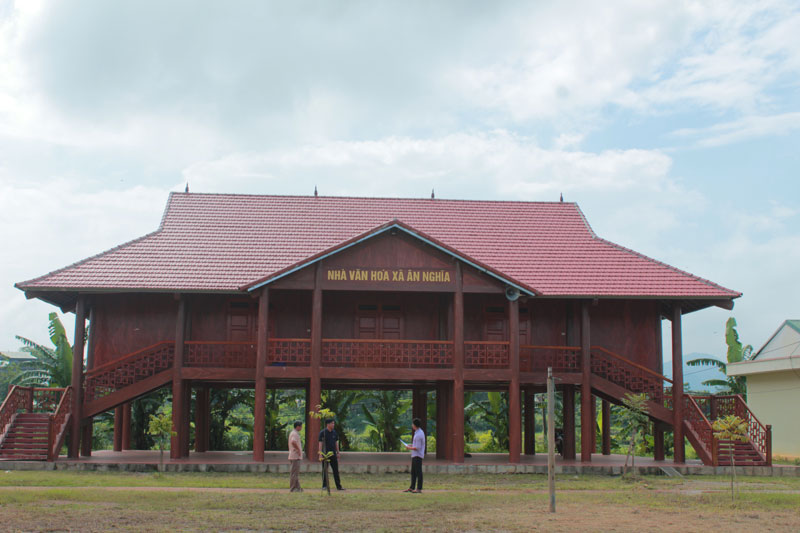
(HBO) – Hoa Binh province has carried out a slew of measures to help villages and communes build culture houses and appropriate cultural institutions so as to improve spiritual lives of local people. The move is part of the province’s effort to realise the national target programme on building new style rural areas.

The cultural house
in An Nghia commune, Lac Son district has been built based on local cultural
identity.
After
ten years implementing the new-style rural area building programme, the
province has been paid due attention to developing culture and sport
facilities. To date, cultural houses have been built in 1,443 out of 1,482
villages. By the end of this year, 97 out of 191 communes are expected to
fulfil the programme’s cultural facility criteria.
The campaign "All people stay united to build cultural life” has been
implemented in Hoa Binh city and all districts. By the end of 2018, the
province had 174,132 out of 212,506 households bestowed with "cultural family”
title, 1,392 out of 1,999 villages receiving "cultural village” title. This year, 184 out of 191 communes are
expected to achieve the programme’s culture criteria, increasing 115 communes
as compared to 2010.
According to Director of the provincial Department of Culture, Sports and
Tourism Bui Thi Niem, culture is an important factor in the new style rural
area building programme. The programme aims better local livelihoods, improve
transport infrastructure, build green and clean landscape, and preserve
traditional culture.
In the coming time, the local cultural sector will continue working to improve
quality of culture and cultural facility criteria, integrate the new-style
rural area building programme into the "All people stay united to build
cultural life” movement.
Investment will be made to build institutions, as well as sport and cultural
facilities, she said, adding the sector will work closely with the steering
board of the new-style rural area building programme to inspect and supervise
the implementation of culture criteria./.
The Standing Board of the Hoa Binh provincial Party Committee has agreed in principle on a proposal by the Standing Board of the Party Committee of Hoa Binh city to gather feedback on the city’s 1:2000 zoning plan, which forms part of its broader urban development strategy.
Hoa Binh province has made notable progress in public administration reform and digital government development, with the satisfaction index among citizens and businesses reaching over 84%, according to recent government evaluations.
Thanks to great efforts by local authorities in recent times, the governance and public administration performance of Mai Chau district has been significantly improved.
In the afternoon of June 6, the Party Committee, the People's Council, the People's Committee and the Fatherland Front of Lac Son district solemnly held a meeting to celebrate the 139th anniversary of the district's founding (1886–2025) and the 79th anniversary of the establishment of the district's Party Committee (1946–2025). There was the attendance of Mr. Bui Van Thang, the Vice Chairman of the Provincial People's Council; Mr. Quach Tat Liem, the Vice Chairman of the Provincial People's Committee; Ms. Dang Bich Ngoc, the Deputy Head of the National Assembly Delegation of the province; as well as the former leaders of the province and district through various periods, who are the natives of the district.
Implementing the Politburo’s Resolution No. 57-NQ/TW on breakthroughs in science – technology, innovation, and digital transformation is a golden opportunity for the northern mountainous province of Hoa Binh to renew growth model, improve competitive edge and shorten digital gap.
Resolution 57-NQ/TW, issued by the Politburo on December 22, 2024, identifies sci-tech, innovation, and digital transformation as strategic breakthroughs to build a developed and prosperous nation. In Hoa Binh province, this spirit is not just a slogan, it’s being put into action through concrete initiatives that form a "new development triangle”: digital citizenship, digital economy, and digital administration.



